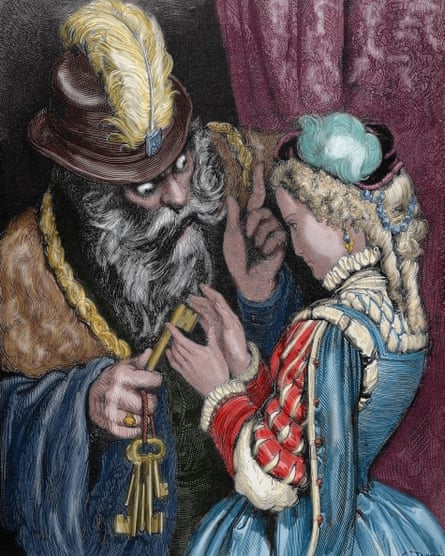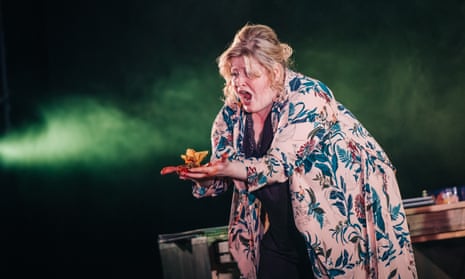We all know Bluebeard. From Jane Eyre to Kubrick’s The Shining, his castle has become shorthand for a place where dark secrets lurk behind locked doors, and the man himself has become a synonym for evil. Today’s Merriam-Webster dictionary defines Bluebeard as “a man who marries and kills one wife after another”.
But what of his young bride, his final wife?
I first met Judit (or Judith), as she is known in Bartók’s opera, three years ago when I was performing in the Vanishing Point production of Bluebeard’s Castle for Scottish Opera.
Who is this woman, what is her goal, who does she see in the mirror?
Bartók’s claustrophobically intense work adapted the folk story that first appeared in Charles Perrault’s 17th-century book of fairytales, although variants existed across Europe and beyond far earlier (English folklore has a rich, handsome and sinister Mr Fox and his brave wife Lady Mary, there’s a version of the story in Arabian Nights, and perhaps you can trace it back to Pandora and her box).
In Béla Balázs’s libretto, the young bride Judit leaves her family to marry the much gossiped about Bluebeard. There are stories about him – but does she believe them? On arriving at this castle, she enters a dark gloomy space where all the doors are tightly locked and the walls are damp. The story of what lies behind these doors unfolds as she asks him to give her the key to each.
This is a role with which it is difficult to make peace in many ways: a vulnerable young woman who stays with her manipulative husband, a man who guards his dark past behind seven ominous doors. How do we perform this piece in 2020, the world of #MeToo very much in our consciousness?

As I got to know Judit, I found a woman who was so swept away in love with her husband that she wanted to know everything. We all have relationships like that, where we want to know someone so completely that we ask questions of them we perhaps don’t want to know the answers to. “Was she prettier than me? Was she a better lover? How many relationships have you had?” The curiosity and insecurity of Judit brings her downfall. There is no unknowing. She cannot go back.
But for me, she is no victim. Bartók’s Judit is taking control: she is asking the questions that others have been afraid to ask. She loves Bluebeard so completely that she cannot conceive that the murderous part of him can be true. The opera’s enigmatic ending, in which Judit is clothed in priceless jewels and a heavy crown and enters the seventh room to join Bluebeard’s three former wives, can be read as the moment she is murdered, or the moment that she finally understands that she is at the mercy of a control freak, a polygamist, a tormentor from whom she cannot escape.
Bartók’s work, premiered in 1918, is a rollercoaster ride with just two solo singers over a vast orchestra – including a pipe organ – performing the most detailed and luscious score. Both characters have such nuanced passages of text and music that we feel we are embedded in their relationship from the first notes they sing. Not only is the size of the orchestra a massive mountain to climb for any singer (90-plus musicians without the aid of a microphone is intimidating, to say the least!) but the vocal range required by both singers is enormous.
From a musical perspective, the role is one of the most satisfying of all to sing. It’s technically demanding, with soaring vocal lines. Doors three and four feature the most exquisite music, enabling the singers to float their sound over a shimmer of colour. The most famous moment – and perhaps the greatest C major chord in all of music – is the opening of the fifth door, behind which Judit sees the great vista of land that is Bluebeard’s kingdom: “Silken meadows, velvet forests … Lofty mountains …” Judith releases a top C – a huge climax both musically and emotionally, and the point, I feel, that she first sees him properly.
Singing it in Bartók’s original Hungarian presents a huge challenge. Learning it back in 2017 was the first time I had sung a role in Hungarian and it’s a daunting task, a whole language that looked entirely different on the page to how the trainer pronounced it on my first day of language coaching! But the richness of the sounds of the words only makes performing this work even more satisfying – it lends itself to creating a varied colour palette from which to sing.
When I returned to Judit a few weeks ago, it was in circumstances I could never have imagined. Nerves are a part of my job but this was on another scale. I was singing it with Gerald Finley, Simon Rattle and the London Symphony Orchestra in a performance recorded for online broadcast. Enough to make most singers nervous, perhaps, but this September concert marked the first time I had performed with an orchestra for six months. It took me back to the beginning of my career: “Can I do this? Will I be good enough? What if my voice has no stamina?”
It was also the first time some of the musicians had played together in many months. The energy in the room was unlike anything I had experienced before.

With venues dark, voices silenced, scripts unread and rehearsal rooms abandoned, I and many of my colleagues have felt lost without jobs, without our passion and drive for the art forms in which we have spent many years training. It’s not just the stark reality of redundancy that causes pain: we are a family that spend hours together crafting performances, works of art, entertainment for our audiences – and all this has had to stop.
As singers, we use our voices, our resonance, to explore themes, stories and the experience of being human. Our voices are so closely connected to our emotional selves that when we are reviewed (yes, we do read them sometimes) it can feel like a critique of who we are.
The themes examined by this opera speak to the times in which we are living: the pressure of exploring something we don’t understand, but fear and dread, and also sudden moments of beauty that are all the more cherished for their brevity.
The release I felt, opening my lungs in preparation for this performance, was an all-encompassing experience, emotionally exhausting as I let go of all the sadness, worry and stress of the past few months into the music. This is a performance I will never forget.
